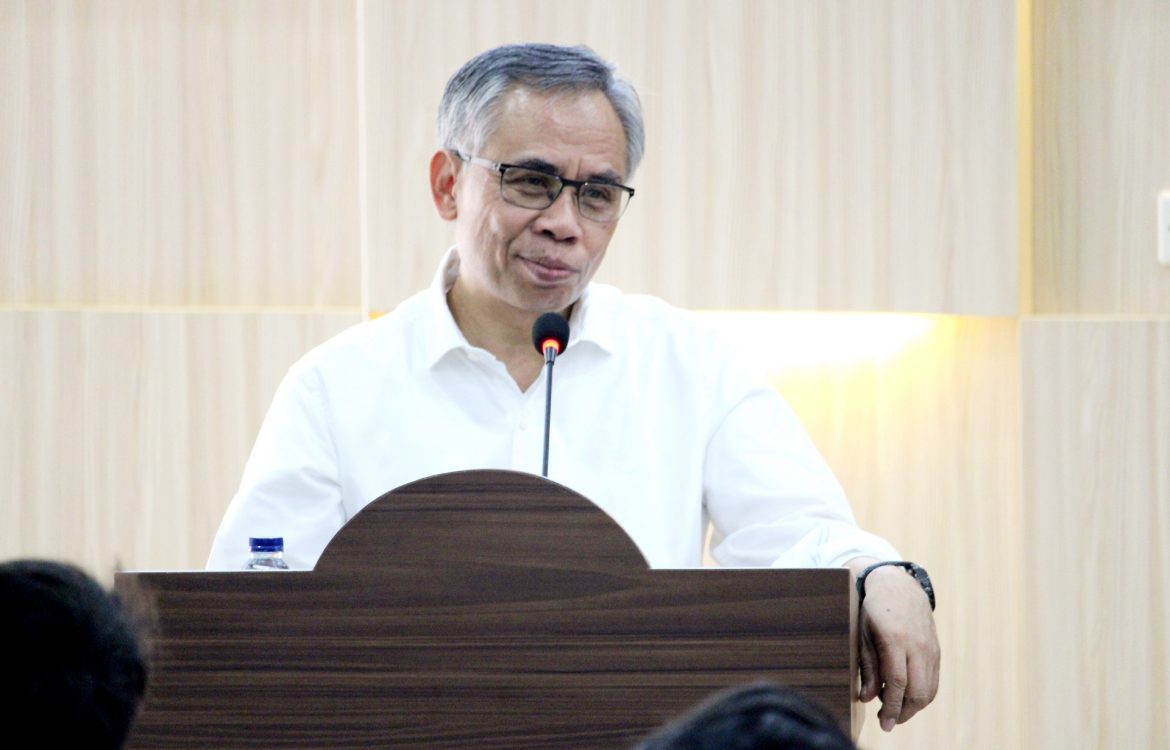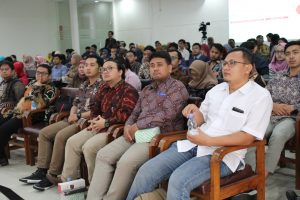
Delivers a Public Lecture in FEB UNS, the Chairman of OJK Discuss the Economics Impact of Coronavirus and Omnibus Law
The current Indonesia’s economics is facing a continuous test. Following the decline in the percentage of Indonesia economics in the 4th quarter of 2019 to 4.97 percent, at the beginning of 2020, Indonesia’s economics has to face another hard condition with the coronavirus outbreak and Omnibus law implementation.

the participants, lecturers, and postgraduate students
Through the public lecture entitled ‘Global and Indonesia Economic Outlook 2020’, that held in Konimex Hall, 4th Building of the Faculty of Economics and Business (FEB) Universitas Sebelas Maret (UNS) Surakarta, on Saturday (15/2/2020), the Chairman of the Board of Commissioner, the Financial Service Authority (OJK), Prof. Wimboh Santoso, Ph.D., reviews in detail the role of government, especially OJK, in overcoming the economic impact that will be faced by Indonesia in 2020.
“The weakening of Rupiah can not be separated from the phenomena in our environment that affect the economy. Indonesian economics can not be isolated from the factors that highly dependent on the economic condition of other countries. Even though currently there is no coronavirus case in Indonesia, economically we are also affected. Corona became a subject that blamed by many people,” explains Prof. Wimboh starting the lecture.
In front of the UNS students who attended the public lecture, Prof. Wimboh Santoso mentioned that coronavirus outbreak in several countries will have a significant impact on countries with high export figures. He predicts that for the first quartal in 2020, China’s economy will decline by more than 1 percent.
“The unrest due to the coronavirus epidemic lead to a risk-off and pushing down the stock market and oil prices. Countries with high export figures will be affected by the outbreak. Luckily, Indonesia’s export is not that high, thus the effect is not significant. Global economic growth is minus 0.5 in the first quarter of 2020 due to corona. While China faces a 1.5 percent decline,” Prof. Wimboh continues.
Not only mentioning the decline of China’s economy, but Prof. Wimboh also mentioning the growth of credit at the end of 2019 that reach 6.08 percent. He considers the anomaly in the financial sector that happened in 2019 as the attitude of businesspeople in Indonesia who wait for the implementation of Omnibus law, which will bring a huge incentive.
The Omnibus law that currently is discussed by the government has become the topic of national conversation and polemic. Later, through the new stances, the government will submit two Drafts Law (RUU), namely the RUU on Employment and RUU on Taxation to the Dewan Perwakilan Rakyat (House of Representative-DPR).
“In the financial sector, there was some anomaly at the end of 2019, with very surprising figures, because credit only grew 6.08 and the Gross Domestic Product (GDP) 5.02 percent. Why the credits decline dramatically, there are several hypotheses. We at the OJK are researching on the factors. This is because of the announcement of the Omnibus law, everyone is waiting because the incentive is enormous. Because of the waiting, the effect is significant, thus if after the Omnibus law is implemented there is no boost, then our GDP will be below 5 percent not to mention the corona outbreak.”
As the Chairman of OJK, Prof. Wimboh also helped to rectify the polemic on omnibus law which become the subject of criticism from academics and workers. He mentions that the Omnibus law that was announced by President Joko Widodo since 2019 aims to boost the investment in Indonesia. Prof. Wimboh added that the Omnibus las will help to accelerate the revision/improvement of the Regulations in Indonesia, which will take a longer time to get revised individually.
On the occasion, Prof. Wimboh shares a number of moves taken by the government in stimulating new sources of economic growth. This including 10 priorities for new tourism destinations and processing the natural resources in Indonesia to promote employment.
“We made 10 priorities for new tourism destinations to create new sources of economic growth, for instance, PT. Freeport should process their product in Indonesia. As much as possible we should process our resources in Indonesia in order to absorb human resources. The new economy source is needed to absorb human resources and export orientation. The objective is how to provide a funding scheme for large payments, MSME, and consumers. We have a master plan for financial service 2020-2024, which covers the efforts to make the financial sector competitive in Indonesia and regionally,” Prof. Wimboh concludes.
Through the general lecture, the Vice Dean of General and Finance, the FEB UNS, Dr. Djuminah, M.Si., Ak., hopes that the visitation of Prof. Wimboh can add knowledge and become subject to deepens study material for the students of FEB UNS. Forward, Dr. Djuminah mentioned that FEB will follow up on OJK’s offer to hold a seminar on the Omnibus law in collaboration with the Faculty of Law (FH) UNS. Humas UNS/ Yefta
